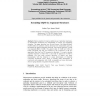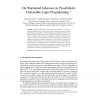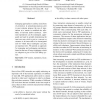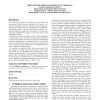65 search results - page 8 / 13 » Fuzzy Argumentation for Trust |
IFIP
2007
Springer
14 years 1 months ago
2007
Springer
Effective methods for metrics definition are of particular importance, as measurement mechanisms are indispensable in virtually any engineering discipline. The paper describes how ...
CCIA
2005
Springer
14 years 1 months ago
2005
Springer
Abstract. Possibilistic Defeasible Logic Programming (P-DeLP) is a logic programming language which combines features from argumentation theory and logic programming, incorporating...
IDC
2009
Springer
14 years 2 months ago
2009
Springer
Abstract. Based on the plethora of proposals and standards for logic- and rulebased reasoning for the Semantic Web (SW), a key factor for the success of SW agents is interoperabili...
EUSFLAT
2003
13 years 9 months ago
2003
Emerging approaches to enforce some form of protection in (pseudo)anonymous peer to peer systems propose the use of reputations as a means to establish the reliability of servents...
ATAL
2008
Springer
13 years 9 months ago
2008
Springer
A rational agent adopts (or changes) its goals when new information (beliefs) becomes available or its desires (e.g., tasks it is supposed to carry out) change. In conventional ap...




